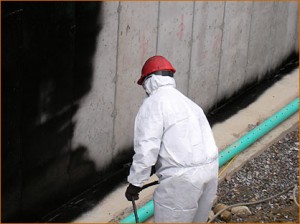Side Story: Product Watch: Air/vapor Barrier Choices
Words: Christopher Bupp
Air Barriers
By Christopher Bupp
 As energy costs continue to increase, the use of air/vapor barriers becomes more critical to today's design environment. The ability to make a building as airtight and energy efficient as possible is a major consideration in building envelope design.
As energy costs continue to increase, the use of air/vapor barriers becomes more critical to today's design environment. The ability to make a building as airtight and energy efficient as possible is a major consideration in building envelope design.
Air/vapor barriers can come in a number of types, depending on the wall design, geographic location and intended purpose of the barrier. The other major criterion for an air/vapor barrier system is the ease of application to make the system totally continuous with no gaps or points at which air and vapor could penetrate the system. Sheet membranes have been popular in the past, due to their factory-controlled thickness and quality control. However, fluid-applied products are becoming increasingly popular today, due to ease and speed of application. CMU backup wall systems lend themselves to fluid-applied materials, while steel stud with gypsum sheathing assemblies effectively can use both sheet and fluid-applied systems.
Because of these factors, Hohmann & Barnard has introduced both sheet and fluid-applied air/vapor barriers to best handle both wall designs. Sheet membranes include TextroFlash, a 40-mil. rubberized asphalt peel-n-stick product, plus Textro Flash Green, also a 40-mil. membrane that uses a clear, pressure-sensitive, adhesive technology that includes about 45 percent post-industrial recycled content to qualify this product as being green. It can contribute toward achievement of LEED standards. Both of these sheet membrane products are non-breathable air and vapor barriers.
Fluid-applied products include Textro Flash Liquid and Textro Flash Liquid VP. Both of these products are VOC-free (Volatile Organic Compound) and HAPs-free (Hazardous Air Pollutants), making them environmentally friendly. Textro Flash Liquid is a non-breathable air/vapor barrier that is applied at a 40-mil. thickness. Textro Flash Liquid VP is a similar material but is breathable, to allow proper drainage and promote drying of the wall cavity in both directions. Both products can be spray — or brush — applied down to 25 degrees Fahrenheit and rising, and can be applied to the recommended 40-mil. thickness in one coat.
Return to Table of Contents